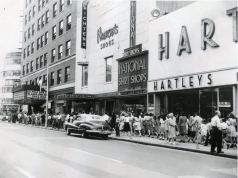This past Wednesday, Florida International University’s Department of Journalism and Media organized a panel on the Russia-Ukraine conflict and its effect on journalism. “Russia’s War on Media” aimed to present the basic concepts of the conflict as well as the role of the press and censorship.
Para leer esto en español, haga clic en este enlace.
Panel members discussed the invasion ordered by Russian leader Vladimir Putin, which is now heading into its third week with indications that hostilities will escalate in the coming days. They painted a dismal picture of the conflict and hope for a settlement.
They included FIU professor Charles Strouse, the digital director of Caplin News, who spent years helping to set up the free press in the region after the fall of the Berlin Wall; Julia Bagg, a reporter for NBC 6 who covered the Sochi Olympics, and Valeriia Popova, a Russian native who worked in the Kremlin’s department of propaganda and is presently a PhD candidate at the Steven J.Green School of International & Public Affairs.
The trio agreed that the invasion has a long-standing geopolitical background, which has to do with Russia’s refusal to accept Ukraine’s rapprochement with NATO and the European Union (EU). Moscow considers the former Soviet republic part of its identity and sphere of influence.
The panel also described press censorship and its consequences on real people as well as the United States’ role in helping restore normality in journalism.
“These are terrifying times, honestly,” said Popova. “Russia is a hammer. What they are doing with the press now, is the way they have always responded. The press has never been free, but it was put as if it was. Right now, people do not have access to the media.”
Strouse added that “It’s a scary time, the threat of nuclear powers is real. Putin has managed to cut off the news to the citizens of his country. What he’s done so far is to build himself a path to the Black Sea.”
Several students from the university asked the speakers questions, both in person and through Zoom.
Asked how the University and Americans can help in an extraordinary situation like this, Strouse said: “I think we can really make a difference. There are a series of organizations that are trying to collect money and food in order to help the Ukrainian citizens. I believe that in a few weeks, it will be clearer in what way we can help. We are in South Florida, supporting independent coverage is a family affair as we are so close to Cuba, so it’s normal for us in the United States to help reach a free press.”
During the panel, it was also emphasized that American citizens should be interested in a conflict so far from their borders. Popova said: “Russians believe that they are fighting the U.S. They are thinking that they are fighting American imperialism and this is one reason why Americans should care about all this.”































